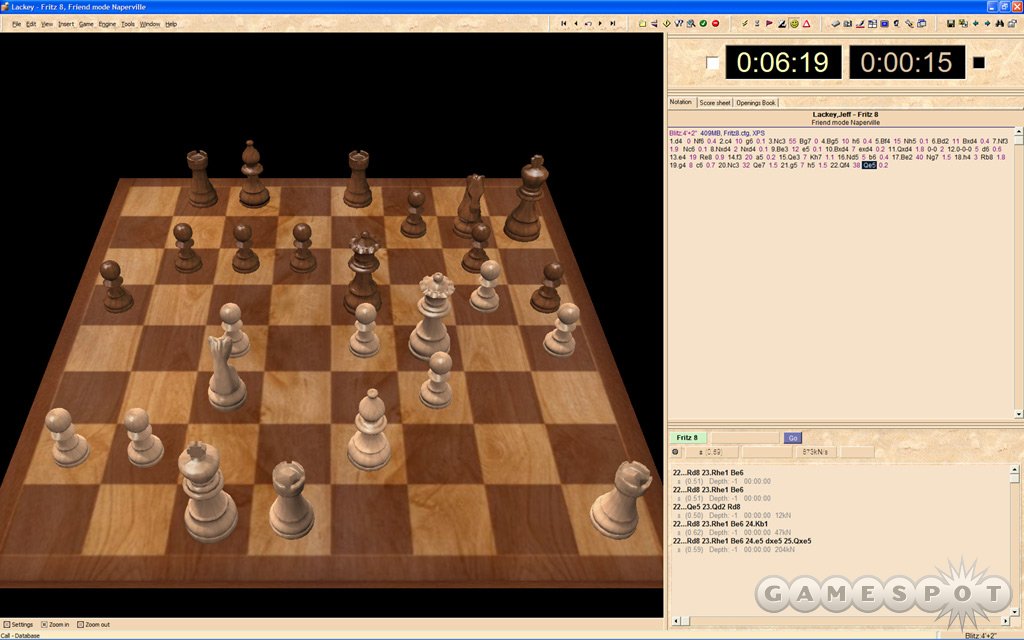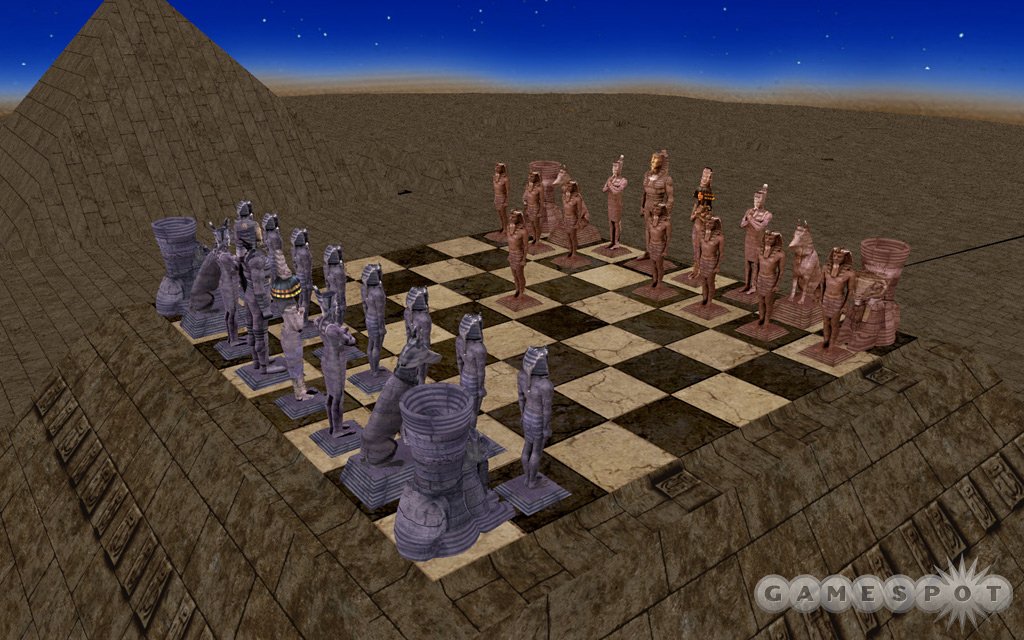If you ask the average computer owner to recommend a chess program, it's a safe bet that you'll hear the name "Chessmaster" far more than any other. But if you ask someone in the serious chess community to recommend a program, the name that most often comes up is "Fritz." Fritz 8 Deluxe is easily the best chess program for the seasoned chess player, and, if you can work through its occasionally clumsy interface, it may well be the best overall chess program for any pawn pusher.

There was a time in which you had to choose between chess programs that were accessible, filled with features, and affordable, and those that were clunky, powerful, and extremely expensive. Chessmaster was the standard-bearer for the first category; Fritz and Rebel were the key titles for the latter. But in many ways the two categories have begun to merge. Chessmaster's playing engine is extremely powerful, to the point that pure playing strength is no longer an issue unless you're a grand master, while Fritz has added numerous bells and whistles and is now priced in the mass-market range. But, while just reading the feature sets on the boxes would lead you to believe that Chessmaster and Fritz 8 Deluxe are very similar, there's still a difference between the two. Chessmaster is focused on "fun," with kiddie boards and tutorials, a plethora of fanciful 3D board sets, dozens of "characters" (with photos and biographies) to play against, tutorials that are mostly targeted at beginners and lower-level players, and a generally lighthearted atmosphere. Fritz 8 Deluxe, on the other hand, in spite of its new 3D board sets and chatty AI opponent, is filled with in-depth analysis tools, serious database capabilities, and even tools to allow you to analyze various chess engines' capabilities (Fritz 8 allows you to choose from a variety of playing engines). When you play Chessmaster, you feel like you're playing a well-done game, while Fritz 8 Deluxe gives you the feeling that you are using a superb set of chess tools and utilities. It will certainly play a great game of chess with you, but that's only the tip of the iceberg.

Let's start with the basics: playing chess. Fritz 8 offers a wide variety of playing modes, including every time control you can think of, a blitz mode, several tournament setups, and even a "shuffle" mode in which the back pieces are rearranged in a random manner. You can manually set the playing strength of Fritz, or you can play in "friend mode." Friend mode is a great concept in which the game analyzes your play and adapts its strength to approximately match your playing level. Sparring mode is another innovative concept, in which Fritz plays at a high overall level but at some point in the game will make a tactical mistake, much as a human might do. You can set the level of sparring mode so that the mistake is a glaring gaffe, or something subtler and thus much easier to overlook. Sparring mode also has an option to point the error out to you as you play, or to tell you afterward that you missed an opportunity on a specific move and allow you to search for what you missed. This is a great training mode, since this is the way humans normally play (that is, a good player making a couple of mistakes in the course of an otherwise well-played game). The one downside to Fritz's chess-playing skills is that it seems that, when you set it to play a weaker game in the normal gameplay modes, it simply plays at a very strong level, but with more random blunders, as opposed to being weaker across the board. One feature that does set Fritz apart from Chessmaster is that in Chessmaster your computer opponent will never resign, while in Fritz 8 you can set the tendency to resign (as well as to accept and offer draws) to as stubborn or as pliant as you like.
Fritz 8 lacks the multitude of preset AI opponents that are bundled with Chessmaster, although you can adjust the AI's playing style and strength to create a variety of opponents. However, while all the AI opponents in Chessmaster come with a photo and biography, once you start playing them, there is no feedback and no chatter--nothing to sustain the illusion that you're playing, say, a 28-year-old barista who plays in a punk band on the weekends. In other words, there's no feeling in Chessmaster that you're playing anything but a computer chess engine once you start a game. Ironically, Fritz 8, the more "serious" of the two chess programs, provides much more personality during gameplay. Fritz 8 will actually talk to you during the course of a game, either through chatlike comments on the screen or aurally, throwing brutal insults, corny jokes, bad imitations, and more at you all through the match. Fritz will greet you by name when you start the program up, and it even has a "memory." So, for instance, if you've made Fritz play black for the last eight games in a row, he may start the next game with a comment like, "You know what boring is? Boring is playing black every single match!" The graphics in Fritz 8 Deluxe are precisely what a good player will want and need. You won't find 100 different styles of Star Wars or Lord of the Rings chess sets, but you will find a number of very nice and, most importantly, very usable 3D sets, as well as some superb 2D sets. Both the 3D and the 2D setups are highly customizable, so without a doubt you will find a set that you enjoy playing with.

Where Fritz really pulls away from the competition is in its excellent database and analysis tools. While there's not enough room here to go into the details of every tool, the database capabilities are powerful enough that you can import, manipulate, access, and utilize huge databases of games in a very practical manner. Opening books and endgame tables can be imported into Fritz 8 and then used by the game in a variety of ways (for example, you can have Fritz use specific opening books, so that if you want to set up an opening book with all the Sicilian variations to practice against that opening, you can not only have Fritz play from that book, but also set how much it favors certain variations). Fritz 8 can analyze games that you've played or that you've imported in as much or as little depth as you like. So, you can have it analyze your game and simply search for blunders, or you can have it analyze your game in great depth, providing excellent natural-language feedback and even searching databases to reference other games with similar positions. The database and analysis capabilities are almost unlimited. However, the caveat is that the manual is extremely thin and very lacking (to the point of being misleading in some cases), and some of the capabilities may require novices to query the company's tech support or ask Fritz aficionados online for explanations. Speaking of the Internet, the purchase of Fritz 8 Deluxe provides you with a complimentary one-year subscription to playchess.com. Not only will you find a world of international playing partners of all skills on this site, but you'll also be immersed in a community of teachers, training modules, tournaments, news, and pretty much everything else related to chess. The purchase price of the game may be justified purely by the wonderful online experience provided at playchess.com.
So, Fritz 8 Deluxe may be the best chess program in the world, but is it the best chess program for you? If you just want to learn how to play chess and play an occasional game against the computer, Chessmaster's relative ease of use may make it the better choice. But if you're a moderate to advanced chess player, or have any desire to become one, Fritz 8 Deluxe is the program for you.